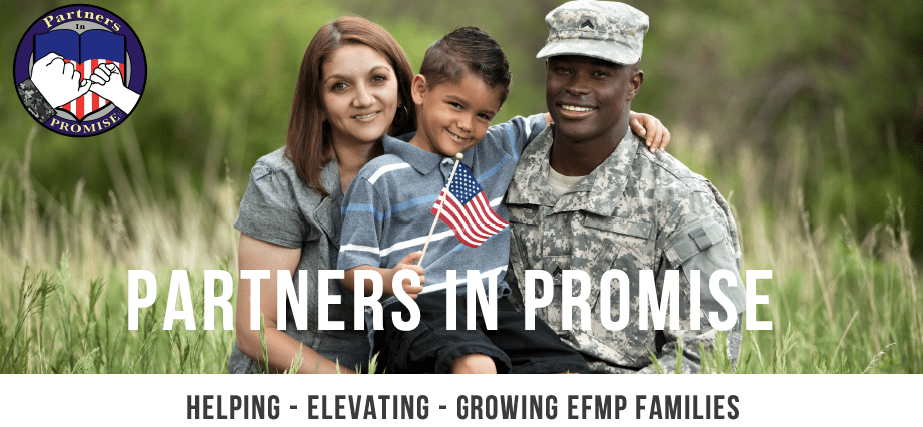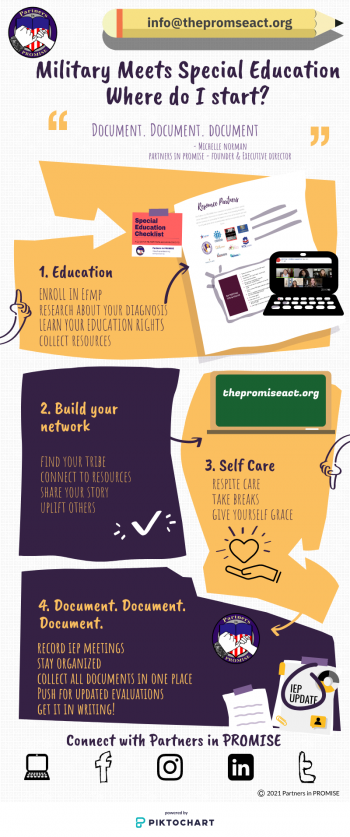If there’s one thing that military parents know, it’s transition. So much changes before and after deployments, joining new schools with a PCS move, and more. But the biggest transition is from active duty to civilian. These transitions are fraught with hardship for many students, but they don’t have to be.
EFMP & You 
Of the over two million military dependents, there are roughly 130,000 families enrolled in the Exceptional Family Member Program (EFMP) for their ongoing medical, mental health, or special educational needs. However, studies show that one in five children in the United States face learning and attention issues like dyslexia and ADHD. These EFMP enrollment numbers do not paint a complete picture of the military special education experience.
Because of the data collected during Partners in PROMISE’s 2021 Military Special Education Survey, we know that our military families – both active duty and Veteran – are not served by the EFMP as well as it could be. This isn’t because of low program enrollment and/or a lack of coverage when families move to an ineligible Veteran status. Though the Military Interstate Children’s Compact Commission (MiC3) exists to advocate for active duty military families, the protections and services do not extend to Veteran families.
Another reason EFMP has not been embraced is stigma. There is stigma in asking for help. There is stigma in admitting weakness. Studies show that embracing our vulnerabilities even within the military culture is a key step in moving past a problem toward solutions.
Partners in PROMISE exists to bridge the education gap that military families face during periods of transition by providing educational resources to all military-connected families. We hope to give parents the tools and confidence they need so that they can advocate for their own children to receive a free and appropriate public education (FAPE).
Partners in PROMISE Resources
We provide resources for special education families that can be used during the transition.
- Acronym 101 – Navigate military, special education and legal jargon with our ABCs of Special Education.
- How to navigate an Individualized Education Program (IEP) meeting with advice from our special education attorney.
- Need help determining if your child is just stressed or has an underlying medical or learning diagnosis? Partners in PROMISE has gathered special education and behavioral experts to help parents “Trust Your Gut.”
- COVID-19 Checklist – For children who are going without services due to the pandemic.
- Sample IEP Binder – Prepare for the transition by getting your paperwork in order.
Sign up Today!
Sign up for Partners in PROMISE’s newsletter to receive access to these resources and more for FREE!
[v] Congressional Research Service. 2020. “Defense Primer: Exceptional Family Member Program (EFMP).” In Focus. January 29. https://fas.org/sgp/crs/natsec/IF11049.pdf (January 29, 2020)
[vi] Horowitz, S. H., Rawe, J., & Whittaker, M. C.. 2017. “The State of Learning Disabilities: Understanding the 1 in 5.” New York: National Center for Learning Disabilities.
The sharing of any non-VA information does not constitute an endorsement of products and services on part of VA.
Jennifer Barnhill is the chief operating officer for Partners in PROMISE.
Topics in this story
More Stories
Soldiers' Angels volunteers provide compassion and dedication to service members, Veterans, caregivers and survivors.
Veterans are nearly three times more likely to own a franchise compared to non-Veterans.
Built by Veterans for Veterans, Warrior PATHH is an in-person program designed to train you to manage struggle, trauma and hardship.







